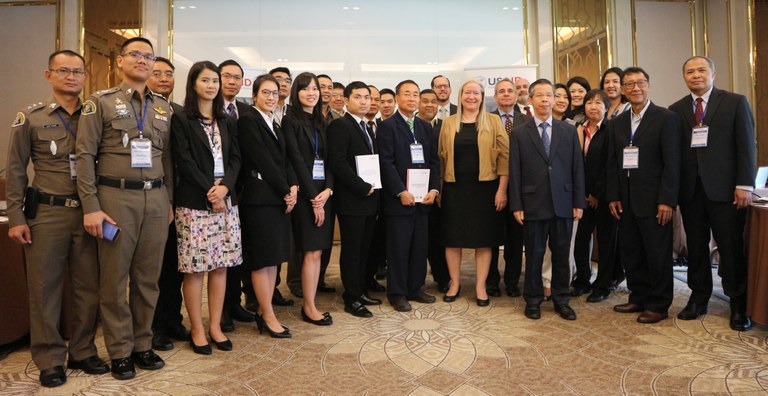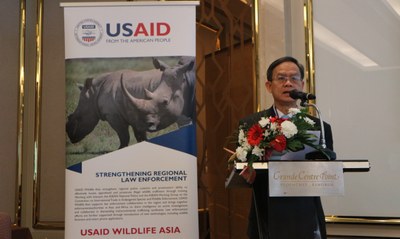Thailand’s Office of the Attorney General and USAID Launch Rapid Reference Guide to Help Prosecutors Fight Wildlife Crime
"There is a common misconception that we need to fight wildlife crime with wildlife related laws, but this new guide opens the doors to an expanded approach with the possibility of applying a much wider legal framework to bring wildlife criminals to justice,” said Dr. Chatchom Akapin, Director General of the International Affairs Department within Thailand’s Office of the Attorney General. “It’s a practical, easy-to-use Guide that I am sure will be a great resource for prosecutors and the wider law enforcement community. I look forward to the great results it will achieve.”
In Thailand, considered one of the main destination countries for illegal wildlife products, there is a wide range of domestic legislation that could be applied to the prosecution of wildlife crimes, and depending on the offence identified, each case will require different types of evidence to be collected. Direct communication between prosecutors and police has also been limited for cases involving critically endangered and species identified under the Convention on International Trade in Endangered Species of Wild Fauna and Flora (CITES).
The Rapid Reference Guide succinctly outlines all laws directly or indirectly related to wildlife protection and wildlife crime, explains what evidence is required, and provides guidance on the early consultation between investigators and prosecutors.
The illegal wildlife trade is estimated at over $20 billion a year, and wildlife crime is the fourth most lucrative global crime in the world after drugs, trafficking in persons and illegal smuggling of weapons.
Due to its strategic location in Southeast Asia, Thailand has become a major transit hub for illegal wildlife products. Criminal syndicates make use of the country’s well-developed transport infrastructure to move illicit goods into nearby consumer countries such as China and Vietnam. Many shipments of rhino horn, elephant ivory and pangolin carcasses and scales have been seized in Thailand, especially at the Bangkok Suvarnabhumi International Airport. While these high-profile seizures are to be commended, the criminals involved often walk away unpunished.
The official launch of the Rapid Reference Guide included presentations on the guide, followed by in-depth working sessions covering topics such as the challenges in charging and prosecuting trafficking cases, measures to boost interagency cooperation, managing bail applications and a discussion around sentencing considerations.
The USAID Wildlife Asia project is currently exploring the possibility of developing similar guides for use in Cambodia, Laos and Vietnam over the next two years.

See more photos from the launch here.
About the Office of the Attorney General, Thailand
The Office of the Attorney General (OAG) is the main authority responsible for conducting prosecutions and trials in Thailand. It is an independent agency, responding directly to the Prime Minister. The OAG has four main authorities and functions, namely: criminal justice administration; safeguarding of national interests; civil rights protection, including legal aid provision; and international cooperation in criminal matters. Organizationally, the OAG is divided into two main areas: the central offices in Bangkok and the regional offices in the provinces. Both the central and regional offices have a mandate to prosecute environmental crimes, including wildlife crimes committed within their jurisdictions.
About USAID Wildlife Asia
USAID Wildlife Asia works to address wildlife trafficking as a transnational crime. The project aims to reduce consumer demand for wildlife parts and products, strengthen law enforcement, enhance legal and political commitment, and support regional collaboration to reduce wildlife crime in Southeast Asia, particularly in Cambodia, Laos, Thailand, Vietnam and China. USAID Wildlife Asia focuses on four species: elephant, rhinoceros, tiger and pangolin. For more information, please visit www.usaidwildlifeasia.org


